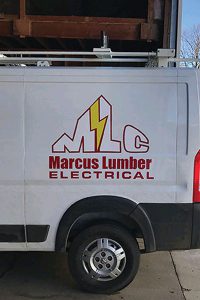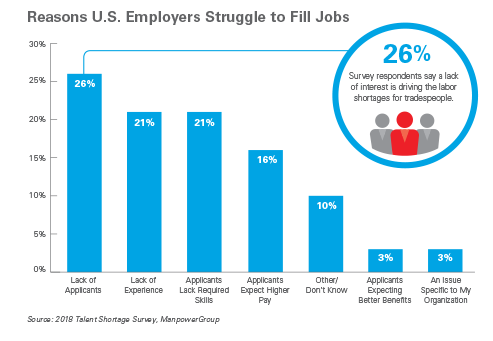Imagine stepping down into your basement and finding an inch of water. Your new house doesn’t have grounded outlets. And that ancient tree in your backyard is one storm away from knocking out a wall. These are all issues that make workers in the skilled trades necessary. Tradespeople, from electricians and plumbers to general contractors and welders, make up a sizeable portion of the customer base for any hardware retailer. They keep the rest of the world running, and the survival of these professions is important for more than just their buying power.
Retailers play a large role in promoting trades work and the people who do it. By being an advocate for training in electrical work, contracting, plumbing and other trades, retailers are helping to preserve a customer base while also bringing in a new generation of tradespeople. These tradespeople are crucial for the industry given how difficult finding new hires has been for employers in the U.S. and around the globe.
Advocating for the trades, and the continuation of apprenticeships, can take on different forms. For Marcus Lumber, a hardware and lumber operation in Marcus, Iowa, promoting the trades has become a central part of doing business. Supporting local tradespeople as customers has long been a part of Marcus Lumber’s business model, but the business has also brought in skilled tradespeople to take on projects for commercial and residential jobs.

Skills to Pay the Bills
Skilled tradespeople can occupy such a wide variety of positions and roles, sometimes it can be difficult to put those careers under one umbrella term. However, there are certain aspects of each trade that link them together: They commonly require certifications, but don’t often require a bachelor’s degree. Most importantly for retailers, tradespeople tend to work on projects and in jobs that require the tools and supplies found at home improvement stores.
That’s why the declining number of skilled tradespeople should concern retailers who rely on this talent pool, and the craftspeople who make it up, for their own business success. In 2018, The Wall Street Journal reported that since the last housing boom in 2005, the share of workers in construction positions has declined in 48 states. From 2005 to 2016, construction workers under the age of 24 declined nearly 30 percent nationwide.
 of U.S. employers report having above average difficulty filling positions.
of U.S. employers report having above average difficulty filling positions.
Source: 2018 Talent Shortage Survey, ManpowerGroup
“Following the housing crisis, businesses that handled new construction or repairs were mostly run by an older generation. The crisis hit those businesses hard, leading to a lot of people working in the skilled trades to step away,” says Grant Leavitt, co-owner of Marcus Lumber. “Now that we’re seeing some economic growth, those businesses are looking for young people with the right training to take on jobs. They’re having a hard time finding them.”
ManpowerGroup, a company specializing in workforce solutions, published its 2018 Talent Shortage Survey of more than 39,000 employers in 43 countries, including the U.S. and Canada. According to the survey, the toughest positions to find labor for in the U.S., Canada and globally are in skilled trades.
When asked about the main reason jobs remained unfilled, 26 percent of U.S. respondents claimed it was because of a lack of applicants for the open positions. The second most common response was applicants lacked the necessary experience, while 14 percent said applicants lacked necessary “hard” skills common among professional tradespeople looking to work in industries like plumbing, electrical and HVAC repair.
While not all of the top positions seeing labor shortages included professional tradespeople, the survey did conclude that most unfilled positions involved post-secondary training, but not always a four-year degree. This opens the door for young people to enter these careers.

Learning a Trade
In order to help further the growth of trades, Marcus Lumber takes a proactive approach to skills training and encouraging young people to consider a training path that can lead to a career more quickly than a traditional college degree.
Marcus Lumber has an employee on the advisory board for a vocational technology program at an area high school, as well as a member of the advisory board for the local community college. Both have helped funnel new talent into the company, Leavitt says, including a current co-owner.
Marcus Lumber also conducts training events centered around its own services, which include plumbing, electrical and HVAC repair. High school and college students are often invited for training at these events, and they receive tours of the Marcus Lumber facility and the service areas involved in these trades.
Top 10 In-Demand Jobs in the U.S.

1. Skilled Trades
“Skilled trades—electricians, welders, mechanics and more—as well as sales representatives, engineers, drivers and technicians, have ranked among the top five hardest roles to fill for the past 10 years.”
—2018 Talent Shortage Survey, ManpowerGroup
2. Drivers
3. Sales Reps
4. Health Care Professionals
5. Teachers
6. Office Support
7. Technician
8. Management/Executive
9. Restaurants/Hotel Staff
10. Manufacturing
Source: 2018 Talent Shortage Survey, ManpowerGroup
“Modern workers in the skilled trades and independent retailers need each other. In both cases, the trades industry and independent retailers are both highly segmented. Most are small businesses. They should ‘get’ each other,” Leavitt says. “Retailers need to be active in marketing trades as a career. Without people to install our products or without enough people to install our goods, our own growth is limited.”
While Leavitt acknowledges that Marcus Lumber is expanding its services into certain trades like electrical and plumbing because they see an unfulfilled demand, he says having such a deficit in trained talent isn’t a sustainable situation for retailers. Having a symbiotic relationship with tradespeople and professional contractors is a critical need for a robust retail operation, he says. That partnership can only be built if young people first choose to receive training and certification in a trade and then continue to grow their skills and their businesses in the coming years.
“Let’s face reality: We’re growing in these areas because fewer people are interested in these careers,” Leavitt says. “With high demand and low supply, we see opportunity. Our job is to sell enough students on considering a pathway that might be a great fit. That can
give those students a heck of an opportunity with us.”
Bringing the Trades In-House
While Marcus Lumber and its employees put a lot of effort into promoting training for tradespeople, the business is also looking to serve customers who need trained plumbers, HVAC technicians and, most recently, electricians.
Marcus Lumber has supplied plumbing and HVAC repair for decades, going back to when Leavitt’s grandfather expanded the business from retail and lumber to a home services supplier. The idea grew from how the business was already selling “the whole home” before the big-box era, Leavitt says.
“Oftentimes my grandfather was acting as the general contractor on these builds. It was a natural fit for us,” Leavitt says. “Today we serve residential and commercial customers with new installs, repairs and replacement. It succeeds because of the people in the department. We have an outstanding manager and he’s built an incredible team. We have two lead technicians under the age of 30, and that was because of our manager’s influence.”
That youth movement is what drives the Marcus Lumber team to remain engaged in building a skilled workforce for a number of different trades, Leavitt says, and not just the ones Marcus Lumber offers. By supplying a path to career growth and an established infrastructure around working in trades like plumbing and electrical work, Marcus Lumber can encourage the growth of the industry overall while also driving its own business.
“We believe service work will be something that could continue growing our company and the industry,” Leavitt says. “It can’t be outsourced, it’s not sold online, and yet it’s high-demand work.”

Working Together
While offering established services has been a point of growth for Marcus Lumber, including a newly developed electrical services department, the company has taken care to keep professional customers on board and not suffering from competition with a supplier like Marcus Lumber.
Leavitt sees his business’s services as “value-added” options for homeowners. They are intended to complement existing contractors who source their supplies from Marcus Lumber, not replace those businesses. Since Marcus Lumber is often involved in drawing plans for home construction due to its full-service reputation, customers are introduced to the business’s plumbing and HVAC services through the same process.
This collaboration leads to better communication with customers, Leavitt says. When each service requires a separate subcontractor, a customer has that many more personalities and service styles to deal with.
“During one of our construction projects, contractors and homeowners can communicate about scheduling building materials, HVAC repair and electrical work all at one phone number,” Leavitt says. “This works for smaller jobs as well, like if a customer wants a bathroom remodeled. They are going to need a plumber for the shower and toilet, a flooring person and an electrician
for the new lights. We can do it all in one stop for the customer.”
Communication doesn’t stop with the customer, Leavitt says. Staying transparent with professionals in the skilled trades is also key. Since the plumbing and HVAC services go back close to 70 years, those professionals in the market understand they are part of the company’s service offerings, he says.
However, the business has not considered adding installed sales, as there are already active businesses serving that demand in the surrounding communities. Open communication with contractors was part of the plan when starting electrical services, with most seeing the added service as a welcome addition.
“We reached out to many now-competitors in the fields to talk things over. They understand there’s more work than they can handle,” Leavitt says. “Working together—whether by supporting training initiatives for early-career advancement or complementing established businesses by picking up jobs they’re too busy to take on—is how our industries have worked for years. We have to keep that level of cooperation going.”
 Hardware Retailing The Industry's Source for Insights and Information
Hardware Retailing The Industry's Source for Insights and Information









